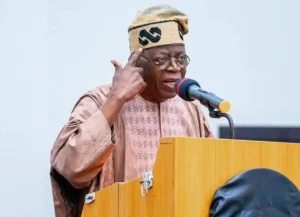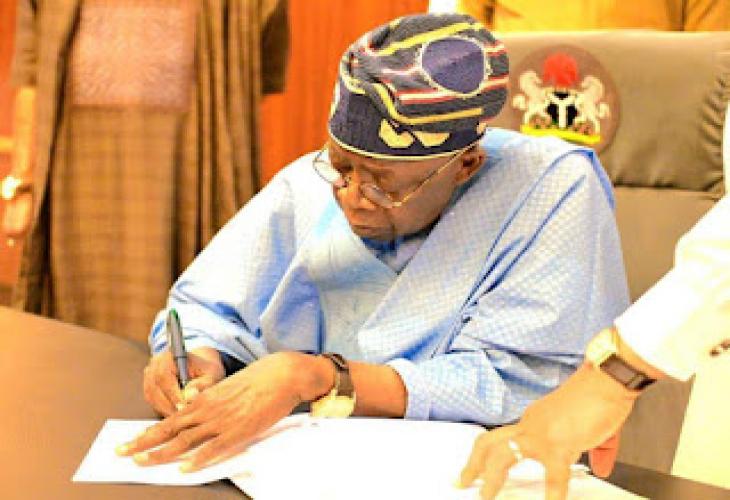President Bola Tinubu’s administration is considering a significant reform to Nigeria’s revenue collection system by potentially barring over 60 revenue-generating agencies, including the Nigerian Customs Service (NCS) and the Nigerian Ports Authority (NPA), from collecting revenues on behalf of the Federal Government. Instead, the administration plans to establish a new centralized body—the Nigeria Revenue Service (NRS)—to take over these responsibilities.

The reform is part of a broader set of tax measures aimed at increasing the efficiency of revenue collection. By consolidating these efforts under one agency, the government intends to simplify the tax system, prevent leakages, and ensure greater accountability. It is expected that a single revenue service will enhance compliance and improve transparency in how taxes and levies are collected across the country.
This move aligns with the government’s objective to boost revenues for funding public services and infrastructure. Given Nigeria’s economic challenges, particularly around underperforming revenues, this reform could be a critical step toward fiscal stability.
The proposed Nigeria Revenue Service will focus on direct tax collection and other government-imposed levies, helping streamline procedures and reduce duplicative efforts across various agencies. The reforms are also expected to strengthen enforcement measures and ensure that all taxable entities meet their obligations.
The policy directive you’re referring to reflects Nigeria’s ongoing efforts to address its revenue challenges, particularly through tax reforms. The country’s current tax-to-GDP ratio is quite low compared to global and African standards, which has created a fiscal imbalance. This imbalance forces the government to rely heavily on borrowing to fund public expenditures, leading to higher debt levels and inadequate funding for essential socio-economic development projects.

By forwarding these executive bills to the National Assembly, the President is signaling an intent to enhance tax revenue, diversify income streams, and reduce the dependency on borrowing. Achieving the goal of an 18% tax-to-GDP ratio could help Nigeria stabilize its fiscal policy, increase public revenue, and improve infrastructure, education, healthcare, and other critical sectors.
The bills may include measures to broaden the tax base, enforce stricter compliance, and close loopholes in the tax system, which would be essential for sustainable economic growth. However, the success of these reforms will depend on their execution, public reception, and the capacity of tax authorities to implement and monitor compliance effectively.
The proposed Nigeria Revenue Service (Establishment) Bill represents a significant shift in how Nigeria plans to manage its revenue collection processes. This bill seeks to rename and restructure the current Federal Inland Revenue Service (FIRS) into the Nigeria Revenue Service (NRS), aiming to centralize government revenue collection under a single agency.
Key aspects of the proposal include:
- Centralization of Revenue Collection: Instead of individual agencies like the Nigerian Maritime Administration and Safety Agency (NIMASA), the Nigerian Ports Authority (NPA), or Nigeria Customs Service collecting their own revenues, these functions will be transferred to the newly established Nigeria Revenue Service. This setup mirrors models seen in other countries, such as the IRS in the U.S. or HM Revenue & Customs in the U.K.
- Focus on Core Mandates: Agencies like NIMASA, Customs, and NPA would no longer be responsible for revenue collection, allowing them to concentrate on their primary functions, such as trade facilitation and regulation of their respective sectors.
- No Merger of Agencies: Despite speculation, the bill does not propose merging any agencies. Rather, it redistributes revenue-collecting duties to the new Nigeria Revenue Service, while keeping the existing agencies intact with a clearer focus on their mandates.
The change is designed to streamline revenue collection and ensure better oversight, efficiency, and accountability in how government funds are managed.
President Bola Tinubu has submitted several tax reform bills to the Nigerian National Assembly under the umbrella of “Transmission of Fiscal Policy and Tax Reform Bills.” These bills are aimed at restructuring Nigeria’s tax system to promote efficiency, transparency, and increased compliance.
The key proposals include:
- Nigeria Tax Bill: This seeks to create a unified fiscal framework for taxation in the country, aiming for a more streamlined and coherent tax regime.
- Nigeria Tax Administration Bill: This bill aims to provide a clear legal structure for the administration of tax laws, ensuring consistency, fairness, and ease of compliance, thereby reducing tax-related disputes and optimizing revenue collection.
- Joint Revenue Board (Establishment) Bill: This proposal seeks to establish a Joint Revenue Board, which would oversee tax administration across various government levels, along with the creation of a Tax Appeal Tribunal and a Tax Ombudsman. These bodies will focus on coordinating tax issues, harmonizing tax administration, and addressing disputes.
Tinubu emphasized that these reforms are critical for enhancing Nigeria’s fiscal institutions and ensuring a more transparent and effective tax system. He expressed confidence that these changes, once passed, would lead to increased investment, improved consumer spending, and overall economic growth for Nigeria.
On the floor of the House of Representatives, Speaker, Abbas, confirmed receipt of the bills, stressing that they were designed in line with the objectives of the present administration.
This passage discusses recent legislative developments in Nigeria, focusing on bills aimed at fostering economic growth and ensuring fiscal responsibility. The House of Representatives consolidated six bills to repeal the Fiscal Responsibility Act of 2007 and introduce the Fiscal Responsibility Bill of 2024. The new bill’s goal is to promote prudent management of national resources, long-term macroeconomic stability, and greater transparency and accountability in fiscal matters.

Speaker Abbas chaired the session and requested that the Committee on Rules and Business set a date for the debate on these consolidated bills. These bills and tax reforms reflect policy recommendations from Taiwo Oyedele’s Presidential Fiscal Policy and Tax Reforms Committee, which aims to simplify and reduce Nigeria’s taxes from 62 to a maximum of nine. Additionally, these reforms align with recommendations from President Tinubu’s Policy Advisory Council, which advocates for a state of emergency on revenue generation in Nigeria.
The reforms are part of broader efforts to overhaul the country’s economic and fiscal management strategies.
The statement by Oyedele emphasizes the need for significant fiscal reforms aimed at alleviating the tax burden on small businesses and vulnerable populations, while ensuring that wealthier individuals contribute fairly to the economy. Here are some key points from the interview:
- Focus on Vulnerable Groups: Oyedele highlights that poorer individuals are often shouldering the tax burden, which is unjust. The proposed reforms aim to relieve them of this responsibility, enabling a more equitable taxation system.
- Shift in Taxation Strategy: Instead of merely increasing taxes for existing taxpayers, the plan involves restructuring the taxation system to ensure that those who can afford to pay more, particularly the middle class and the wealthy, do so.
- New National Fiscal Policy: A comprehensive national fiscal policy has been established, outlining the government’s goals and strategies for revenue generation and allocation. This policy aims to create a more structured approach to taxation.
- Redrafting of Tax Laws: Specific tax laws—including company income tax, personal income tax, value-added tax, and others—are being revised to enhance revenue collection and ensure fairness in the tax system.
- Centralized Revenue Collection: The reform proposes transferring revenue collection responsibilities from 62 different agencies to a single agency. This centralization is intended to improve efficiency and effectiveness in tax collection.
- Targeted Agencies: Various government agencies involved in revenue generation, such as the Federal Inland Revenue Service, Nigeria Customs Service, and others, are currently managing revenue collection but will be streamlined under the new framework.
Overall, these reforms aim to create a fairer taxation system that supports economic growth and development while protecting the most vulnerable segments of society.
The comments from Dr. Eugene Nweke and Taiwo Fatobilola reflect significant concerns regarding the implications of a new law that seems to involve outsourcing customs functions, particularly revenue collection, to third parties. Here are some key takeaways and implications from their statements:
- Outsourcing Revenue Collection: Nweke points out that customs agencies worldwide are primarily focused on revenue collection and anti-smuggling operations. By potentially outsourcing these functions, he suggests that it could undermine the effectiveness of customs services, which are specialized in these areas. This raises questions about accountability, efficiency, and the potential for revenue loss.
- Technicalities of Revenue Collection: Nweke emphasizes the complexities involved in revenue collection, indicating that it requires specialized knowledge and training. He advocates for enhancing the skills of existing customs personnel rather than outsourcing, highlighting the importance of investing in capacity-building for customs officials.
- Skepticism about Implementation: Fatobilola expresses skepticism about the feasibility of outsourcing revenue collection, noting the significant training and expertise that the Nigeria Customs Service (NCS) has already developed. His comments reflect a broader concern about the government’s understanding of the practical challenges involved in implementing such a law, suggesting that it may not be as simple as the government perceives.
- Lack of Awareness among Officials: Abdullahi Maiwada’s comment about not being aware of the bill suggests a possible disconnect between policymakers and the operational realities of customs enforcement. This could lead to ineffective implementation of the law and further complications in customs operations.
- Call for Training and Support: Both Nweke and Fatobilola advocate for more robust training programs for customs officials and importers. This indicates a preference for strengthening existing systems rather than introducing external parties that may lack the necessary expertise.
In summary, the responses from industry experts highlight significant concerns regarding the implications of the proposed law. They advocate for enhancing the capacity of the NCS rather than outsourcing critical functions, emphasizing the complexities involved in revenue collection and the need for a knowledgeable workforce.
Click here to join our Telegram Channel

